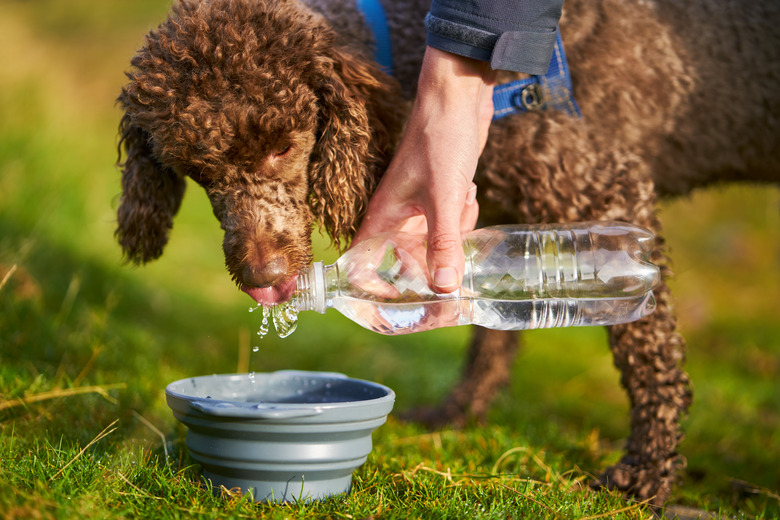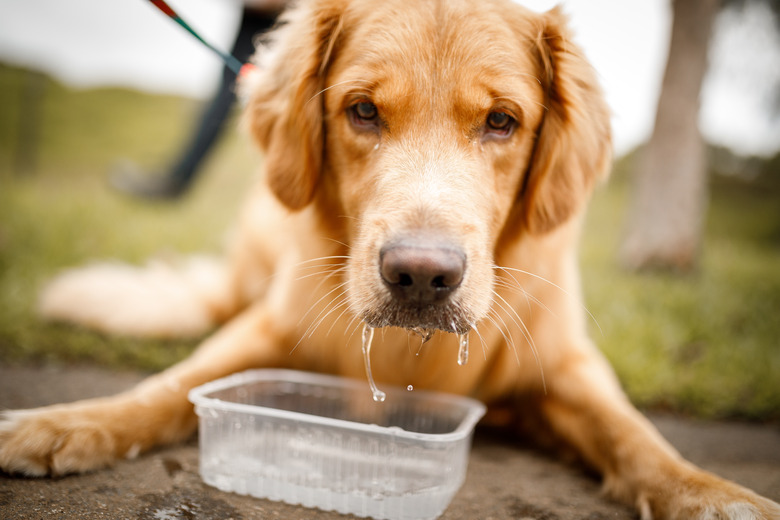Can You Give Sugar Water To A Puppy?
Puppies, especially small or toy breeds, are susceptible to low blood sugar, which can cause symptoms like weakness, disorientation, and loss of appetite. This condition can be treated in the short term with Karo syrup for puppies or water with sugar, but puppies will need veterinary care. Dangerously low sugar levels in a puppy can lead to seizure, coma, and even death.
Puppies are susceptible to hypoglycemia
Puppies are susceptible to hypoglycemia
Puppies of all breeds can experience hypoglycemia, otherwise known as low blood sugar. However, small and toy dog breeds, like Chihuahuas, Pomeranians, and Yorkshire terriers, are more at risk.
Puppies under the age of 3 months are at risk for juvenile hypoglycemia because they can't yet regulate their blood glucose levels. Puppies are also at risk if they are experiencing malnutrition, intestinal parasites, and stress. The increased risk is why young puppies are often given water with sugar as a dietary supplement to ward off low blood sugar.
Water with sugar for dogs
Water with sugar for dogs
Sugar water is a life-saving treatment for puppies whose immature system fails to regulate glucose. Puppies (and adult dogs) experiencing hypoglycemia need to be given sugar water immediately to raise their blood sugar level, and they must also see a veterinarian.
Sugar water for puppies can be made with white table sugar, corn syrup, or honey. If you have Nutri-Cal, a high-calorie dietary supplement that is used by veterinarians and breeders, rub the paste onto your fingers and smear it on the inside of your dog's mouth. You can also use Karo syrup for puppies.
Mix about 3 tablespoons of whichever sugar product you have on hand with 1 tablespoon of water. Then, dab the water under the tongue or apply it to the puppy's tongue using an eyedropper. If your puppy is unresponsive, rub the sugar solution directly onto his gums while calling your veterinarian. Don't worry if your puppy can't swallow the solution; the sugar will dissolve and be absorbed into the gums.
Symptoms of hypoglycemia
Symptoms of hypoglycemia
Puppies suffering from hypoglycemia will show weakness, trembling, lack of coordination, disorientation, and loss of appetite. Puppies may lose consciousness or have a seizure. During a seizure, dog breeds may collapse, jerk, drool, and have muscle spasms and twitches. Without sugar water, hypoglycemia can develop into stupor, coma, and death. If you notice any of these symptoms (or a combination of them) in your puppy, contact a veterinarian immediately.
Prevent hypoglycemia in puppies
Prevent hypoglycemia in puppies
Before you have to resort to mixing water with sugar, set up your puppy for success with proper care and nutrition.
Small-breed puppies need to be fed a well-balanced diet of puppy food four times a day. Some breeders will even use sugar water to help revive puppies who are weak and tired at birth. Puppies also need to be kept nice and warm at home.
Regularly take your puppy to the veterinarian for any necessary appointments and communicate with the vet if you notice any symptoms of illness in your puppy.
When to seek veterinary care
When to seek veterinary care
It's always an emergency when puppies — and dogs of all breeds — experience hypoglycemia. Contact your veterinarian immediately and take your precious pup to the animal hospital as soon as possible. Hypoglycemia can be deadly, but quick intervention can mean a long life for your puppy.
The veterinarian will treat your puppy and work to determine what caused the problem. Hypoglycemia can be a symptom of an underlying illness, like severe liver disease, tumors in the pancreas, and other diseases, and only a veterinarian can diagnose those causes.
Veterinarians will likely do a physical examination, look at your dog's medical history, and run any tests needed, which could include a urinalysis and blood test. If your veterinarian suspects that a tumor may be to blame, she may perform an ultrasound or take an X-ray. Treatment for hypoglycemia might include warming puppies to a normal temperature and giving IV fluids.


